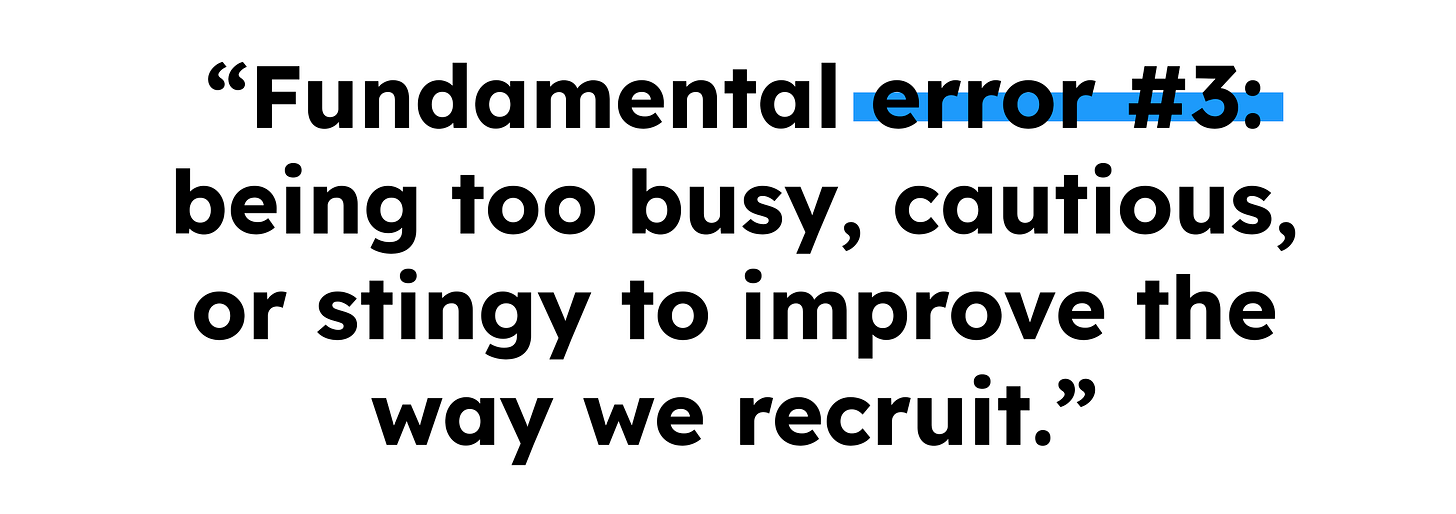Three fundamental recruitment errors
Obsessed with the issues we were experiencing with hiring, we researched and discovered that they are hugely frequent. Simply, some fundamentals are widely misunderstood…
When we started working on better recruitment, to stop hiring people that were great on paper and interviewing but failed to deliver in real life, we discovered that we weren’t the only ones struggling: according to a well-known study by Leadership IQ, 46% of hires fail within 18 months * - In other words, the average recruitment process is very unreliable.
Lack of data
Then we started talking to other organisations. The most surprising thing was that most often weren’t even sure whether they were hiring rightly or not. Only a few tracked how good their new hires were; a few more at least had an idea of how many left or got fired - even if it wasn’t a properly defined KPI for them; but most people were not tracking recruitment success at all.
Again, we weren’t the only ones landing at that conclusion: even in the US, only about a third of companies say they check whether their hiring practices lead to good employees * (and if those are the ones who dare to recognise it, imagine how many actually don’t do it…). So:
Of course, if we don’t even stop to think what’s right or wrong in our process, it’s very hard to improve it consistently. Ideally, results are analysed to understand what works well and which recent hires didn’t work (or didn’t fully succeed) and why, to then refine the recruitment process step by step. Without data obtained from our results, how can we do that?
Lack of analysis
But then we found that, as it had been our case, most people we talked to could even start with something more basic. Their recruitment processes were based on “how it’s always been done”, “we strongly believe that…”, “we outsource most of it anyway”, “it’s what the big boss wants”, or even “don’t tell me… this was already here when I arrived”. It’s what we call superstitious hiring: recruiting as if we couldn’t really understand what’s going on. Seeing a black cat is bad luck, and so is a gap in a CV. But we knew that there were reasons to help things change: not only we got better matches ourselves by rationally improving our processes, but we also learned that research agreed: smart processes (not rocket science) can be 70% better than mediocre alternatives. *
Once we critically analyse the process, we will get ideas to improve it... and then comes the need to execute those ideas.
Lack of execution
We won’t underestimate how difficult it is in some organisations to get approvals, a bit of budget, and change things. However, not walking the talk is still a fundamental error:
Getting started...
The mission of this article will be accomplished if it helps one company get inspired and, for example:
Start analysing their new-hire turnover and its potential root-causes.
Replace one mediocre/superstitious step (unstructured interviews with the CEO anyone?) with a rational one (panel-based decision-making, please!)
Or simply execute an improvement to the process that’s been in the backlog for too long.
We know it’s not easy! These fundamental errors are sometimes too abstract to put into practice. Luckily, no need to hire process-improvement experts just yet: in our next article, we will share an actionable selection of easy-to-spot key mistakes that make our talent acquisition processes unreliable… Please stay tuned following us here on LinkedIn or subscribing to our newsletter. Feedback, ideas or requests? please subscribe and stay tuned! Feedback, ideas or requests? Please get in touch! We’re here to help if you need a hand.






